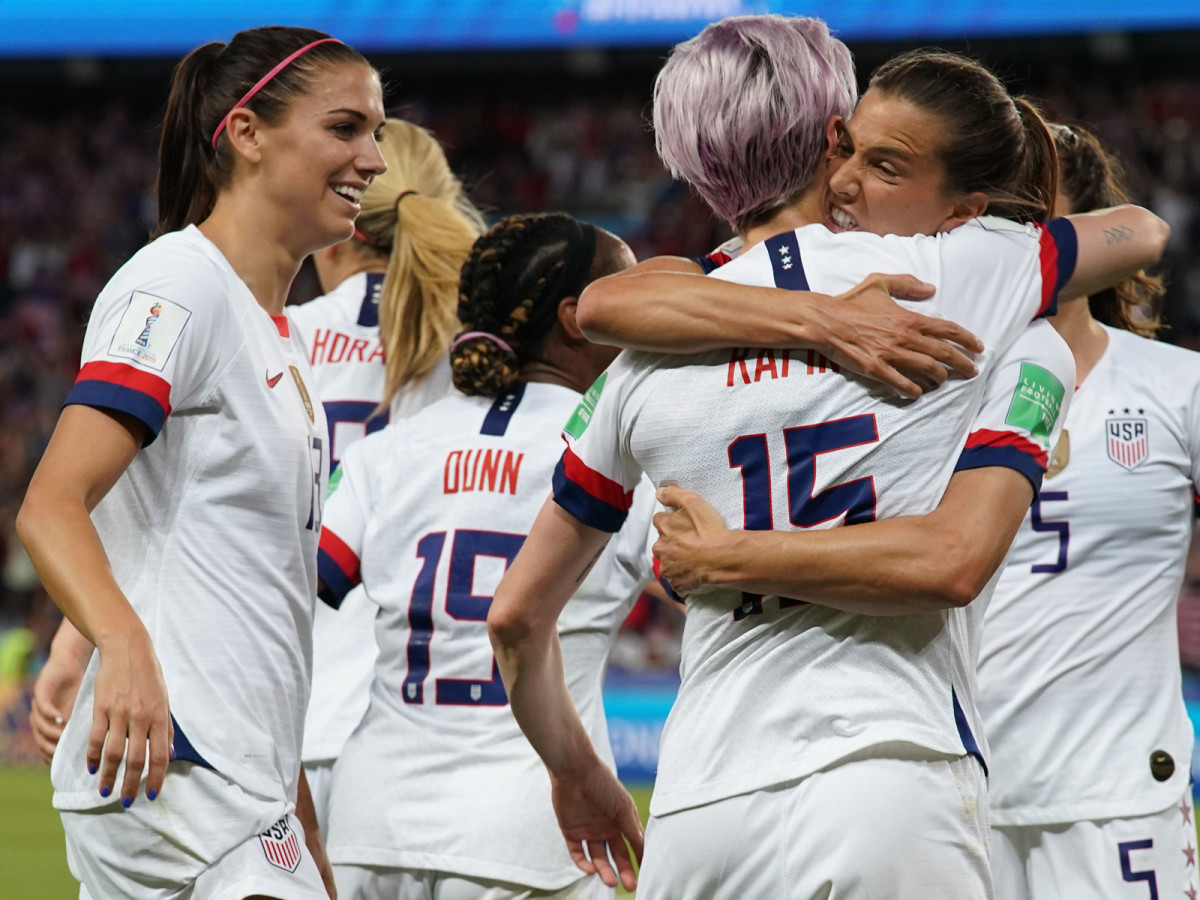Megan Rapinoe's Pride Shines Through as She Embraces Her Biggest Challenges

PARIS — Fifty years to the day after the Stonewall Uprising in New York City became a touchstone of the LGBT movement, four years after the Supreme Court made same-sex marriage a nationwide right and three days after President Trump called her out on Twitter for protesting his policies (including those toward the gay community), Megan Rapinoe celebrated Pride Month in the most Megan Rapinoe of ways. She cut through the cacophony of noise that surrounds her these days, delivering a rainbow-hued performance for the ages in the U.S.’s 2-1 World Cup quarterfinal victory over France on Friday.
Every time you wonder if Rapinoe can handle the challenge that she has embraced—to be not just a world-class athlete but a force for social change in a turbulent time—she somehow finds a way to rise to the occasion.
On Friday, that meant facing the most intense atmosphere of this or any Women’s World Cup—taking on the home team, in Paris, at a sold-out Parc des Princes—and scoring both U.S. goals to send the French fans and players home in tricolore tears. Rapinoe bent a fifth-minute free kick through a thicket of bodies into the net for yet another early U.S. goal in this tournament, and in the 65th minute she emphatically finished a glorious U.S. counterattack that included sterling work by both Alex Morgan and Tobin Heath to set her up.
When asked afterward if she was motivated by Pride Month, Rapinoe, who is currently dating WNBA star Sue Bird, smiled. “Go gays!” she said. “You can’t win a championship without gays on your team, it’s never been done before. Science right there! … To be gay and fabulous during Pride Month at the World Cup is nice.”
It certainly didn’t surprise anyone that the U.S. president singled out Rapinoe on Twitter this week—honestly, it felt inevitable—after a months-old video was released on Monday in which Rapinoe said she wouldn’t go to “the f—king White House.” (She later apologized for swearing but stood by her White House position.) But it’s also worth specifying exactly what happens when Trump includes Rapinoe’s Twitter handle–the right one–in a post; he knows it will stoke hundreds of thousands of his followers (and plenty of Russian bots) in a chorus of (at best) criticism over her patriotism and (at worst) volleys of hate speech against her—and, yes, her sexual orientation.
Trump apparently doesn’t understand power imbalances. And yet Rapinoe’s own power keeps rising, every single day, thanks to moments like Friday.
“I don’t really get energized by haters or all that,” Rapinoe said after the game. “I feel like there’s so many more people that love me, so I’m like, ‘Hey, keep loving me, this is great!’ I’m more energized by that. And there was obviously tons of support from the group, friends and family. You want to come out and have a great performance and take the chances that are given to you.”
The U.S. certainly didn’t dominate possession in this game, and the Americans often had five players on the back line, which France coach Corinne Diacre said was a big surprise to her. But the U.S. defense held firm. Julie Ertz especially was a rock in her defensive midfield role, and the fullbacks (Crystal Dunn and Kelley O’Hara) had their best game of the tournament, neutralizing much of France’s wide threats and using their speed to close the gap whenever the French wingers got free.
U.S. coach Jill Ellis made the head-scratching choice of keeping Lindsey Horan (one of the world’s best midfielders) on the bench in favor of Sam Mewis—Ellis said it was based “on form”—but the U.S. still won the game against a team that many had picked to beat the Americans after a 3-1 French friendly victory in January in Le Havre.
But Diacre said something meaningful after the game. The U.S., she explained, is a completely different team in major tournaments than it is during friendlies. That might explain why France has been able to beat the U.S. outside major tournaments but never in one, a streak that continued on Friday.
"Such a big performance by our group tonight,” Rapinoe said. “Obviously, we didn’t have the best night on the ball, but the focus defensively and the discipline to do what we did tonight is tremendous. And we were ruthless on our chances. Moving on to the next round is all that matters—in a game that we’ll never forget in Paris.”

It’s also clear that Rapinoe feels empowered by the support she has inside the U.S. team, which comes from the coaching staff and every player.
“Pinoe is just an amazing teammate,” Morgan said after the game. “She’s like the heart of this team … Everything that has been going on is just noise. When you step on the field, it’s us, the 23.”
Added Ellis, about the uproar around Rapinoe: “It almost just feeds her. She’s just a big personality, both on and off the pitch. And I think she thrives in these moments. I can’t get 2011 out of my mind, the ball she played to Abby Wambach [against Brazil]. It just has always sat with me. Even when we have young players come in, I always say, ‘Ask Megan about those moments.’ Because there’s a never-say-die attitude. She loves and lives for those moments. The bigger the stage, the more she’s going to respond.”
There has been growth on Rapinoe’s part, too. She’s more worldly than she used to be. When the U.S. played France at the 2012 Olympics, Rapinoe kept talking about “Tiny” until she was finally asked: “Who’s Tiny?” She meant the French player Gaetane Thiney.
In the years since, Rapinoe played for Lyon and learned some French. And so, on Friday night, she said in a perfect French accent: C’est magnifique ce soir.
Tonight it’s magnificent.
To be gay and fabulous during Pride Month at the World Cup is nice.
